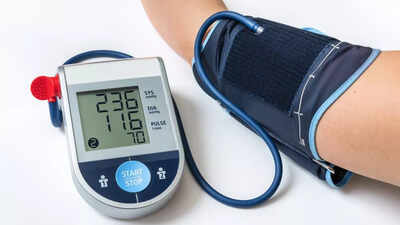Control high blood pressure using this common kitchen ingredient, says Harvard doctor | - Times of India

Control high blood pressure using this common kitchen ingredient, says Harvard doctor
High blood pressure, or hypertension, affects over one billion people worldwide, according to the World Health Organization. Often referred to as the “silent killer,” hypertension usually presents no clear symptoms while gradually increasing the risk of heart attacks, strokes, kidney failure, and other life-threatening conditions.
While medications and lifestyle modifications remain essential for controlling blood pressure, recent insights from medical experts point to a natural and widely available remedy—beetroot juice.Dr. Saurabh Sethi, a renowned gastroenterologist trained at AIIMS, Harvard, and Stanford, recently shared a valuable insight on social media that’s gaining traction among both health professionals and the public.
In a video posted on Instagram, Dr. Sethi referred to beetroot juice as “one of the most effective beverages for people with high blood pressure,” highlighting its science-backed role in cardiovascular support.
Natural Ways to Control High Blood Pressure Effectively
The effectiveness of beetroot juice in managing blood pressure lies primarily in its high nitrate content. When consumed, the dietary nitrates found in beets are converted into nitric oxide in the body. Nitric oxide is a molecule that helps relax and dilate blood vessels—a process known as vasodilation.
This leads to improved blood flow and a reduction in blood pressure levels, particularly systolic blood pressure (the top number in a BP reading).
According to a 2021 review published in Nutrients, dietary nitrate supplementation, especially from beetroot juice, significantly reduced blood pressure in both healthy individuals and those with hypertension. The blood pressure-lowering effects were seen within hours of consumption and could last for up to 24 hours with consistent intake.
Beetroot juice isn't just beneficial because of nitrates—it’s also packed with essential minerals and antioxidants. Here's a closer look at its key nutrients:
According to the US Department of Agriculture (USDA), an 8-ounce serving of beetroot juice contains approximately:
In addition to Dr. Sethi’s recent statement on Instagram, other experts have praised beetroot juice for its potential cardiovascular benefits.
Research conducted by Queen Mary University of London in 2015 showed that people who drank 250 ml of beetroot juice daily experienced a reduction in blood pressure by an average of 8 mmHg systolic and 4 mmHg diastolic—a level comparable to what is achieved with some anti-hypertensive medications.According to a report by the American Heart Association, even a modest reduction in blood pressure can translate to significant public health benefits, such as a 10% decrease in the risk of stroke and a 7% reduction in heart disease mortality.
Beetroot juice has also gained popularity among athletes and fitness enthusiasts for its performance-enhancing effects. Because nitric oxide improves blood flow and oxygen delivery, it is often used as a natural pre-workout drink to improve stamina and recovery.A 2020 study published in the Journal of Applied Physiology noted that beetroot juice can enhance endurance by up to 16% in high-intensity training, particularly in individuals with lower fitness levels.Additionally, its antioxidant properties support immune function, reduce oxidative stress, and may offer protective effects for the liver and brain.
While beetroot juice is natural and generally safe, it is not a replacement for prescribed blood pressure medications, especially for individuals with moderate to severe hypertension. Some important points to note:
To experience the potential benefits:
Dr. Sethi recommends incorporating beetroot juice as part of a comprehensive blood pressure management plan, which includes:
- Regular physical activity
- Low-sodium, high-potassium diet
- Stress reduction techniques such as yoga or mindfulness
- Maintaining a healthy body weight
- Consistent sleep schedule
You may also like...
Diddy's Legal Troubles & Racketeering Trial

Music mogul Sean 'Diddy' Combs was acquitted of sex trafficking and racketeering charges but convicted on transportation...
Thomas Partey Faces Rape & Sexual Assault Charges

Former Arsenal midfielder Thomas Partey has been formally charged with multiple counts of rape and sexual assault by UK ...
Nigeria Universities Changes Admission Policies

JAMB has clarified its admission policies, rectifying a student's status, reiterating the necessity of its Central Admis...
Ghana's Economic Reforms & Gold Sector Initiatives

Ghana is undertaking a comprehensive economic overhaul with President John Dramani Mahama's 24-Hour Economy and Accelera...
WAFCON 2024 African Women's Football Tournament

The 2024 Women's Africa Cup of Nations opened with thrilling matches, seeing Nigeria's Super Falcons secure a dominant 3...
Emergence & Dynamics of Nigeria's ADC Coalition

A new opposition coalition, led by the African Democratic Congress (ADC), is emerging to challenge President Bola Ahmed ...
Demise of Olubadan of Ibadanland
Oba Owolabi Olakulehin, the 43rd Olubadan of Ibadanland, has died at 90, concluding a life of distinguished service in t...
Death of Nigerian Goalkeeping Legend Peter Rufai

Nigerian football mourns the death of legendary Super Eagles goalkeeper Peter Rufai, who passed away at 61. Known as 'Do...





